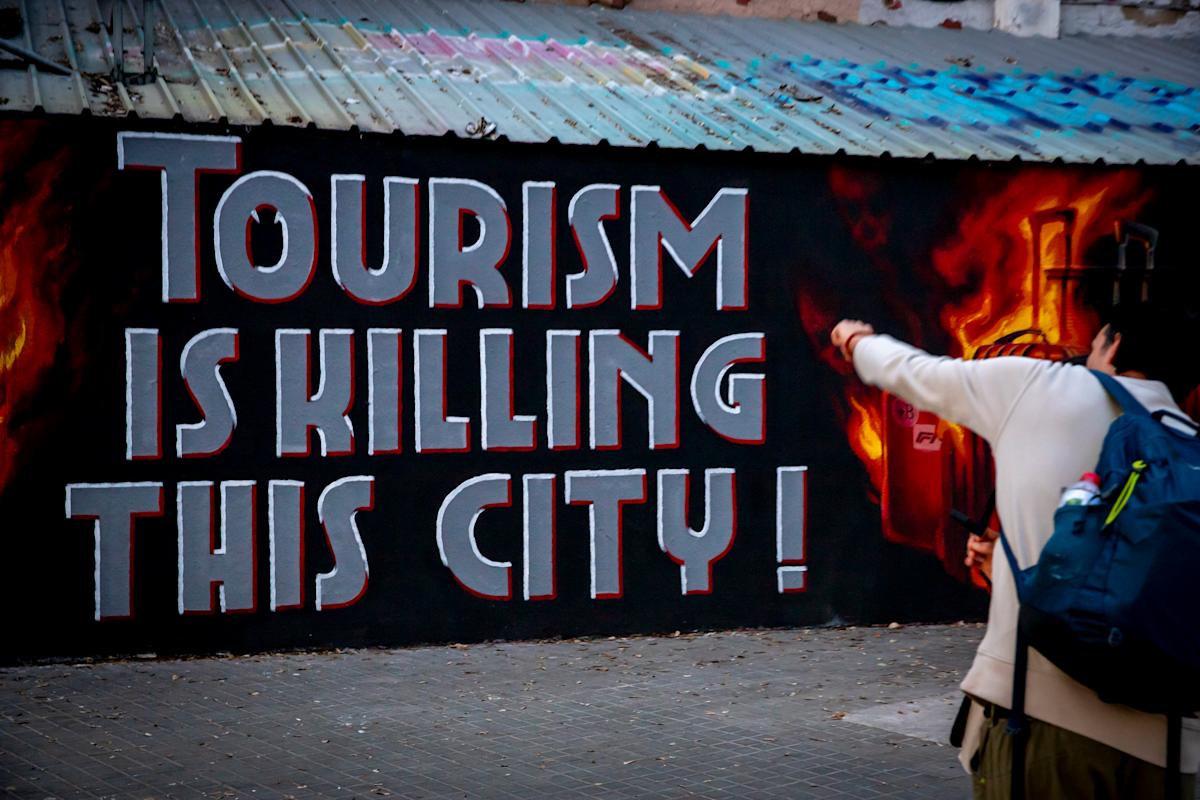Spain is the most popular holiday destination for Britons, with more than 18 million visits last year.
But not everyone is happy about this.
Anti-tourism protests have become a frequent occurrence across the country in recent years, with more to come this summer.
So why is this, and what does it mean for tourists from the UK? Yahoo News UK takes a look.
Why are people in Spain angry about tourism?
Locals in popular destinations have organised a number of demonstrations against tourism in recent years, with banners featuring messages such as “tourists go home”.
The impact of tourism on housing costs is a common theme at protests, with people blaming short-term rental properties such as those listed on Airbnb. Spain launched a crackdown on the platform this week, ordering it to remove 65,000 listings.
People have also claimed tourists are exacerbating traffic congestion and overburdening services such as water supplies.
Where are the protests happening?
In popular destinations across the country.
Thousands of people protested in the Canary Islands, which has one million visitors a month compared to a population of 2.2 million, on Sunday.
“The number of tourists and people who come to live here is crushing us,” Sirlene Alonso, from Gran Canaria, told Reuters.


Thousands of people protested against tourism in the Canary Islands on Sunday. (Getty Images)
Other protests have occurred in the likes of Mallorca, Barcelona, Malaga and Seville.
Further protests are set to happen in Spain on 15 June. They have been coordinated by the Southern European Network Against Touristisation.
The Local has reported Barcelona, Ibiza, the Canary Islands and San Sebastian – as well as other hotspots in Europe – are places where the protests will occur. As well as protest marches, it said there could be picket lines at airports, tourist sites occupied and tourist buses blockaded.
What does this mean for UK holidaymakers?
While there is strong anti-tourism sentiment in popular destinations, holidaymakers are unlikely to be in danger. The UK Foreign Office does not mention anti-tourism protests in its travel advice for Spain.
However, there is a chance tourists could face hostility, especially if they are visiting when protests are happening.
For example, tourists dining in Barcelona were sprayed with water guns by protesters in July last year. One sign also read: “Dear tourist: balconing is fun!” Balconing is the dangerous practice of jumping into a swimming pool from a balcony.


Diners are targeted in Barcelona’s Las Ramblas in July last year. (AFP via Getty Images)
Campaigners also installed symbolic cordons in front of restaurants, in some cases leading to shouting matches with customers.
Earlier this month, a travel boss warned a growing number of UK holidaymakers are concerned about the protests.
Steve Heapy, chief executive of airline and tour operator Jet2, said there is a “perception” among some people that overseas visitors are not welcome in the country.
“We’ve had people ringing the call centre and going into travel agents asking questions like: ‘Is Spain safe? Are we still welcome in the resort?’


Customers react as demonstrators protest against mass tourism in Barcelona’s Las Ramblas. (AFP via Getty Images)
“It is becoming a big issue unfortunately, and perception becomes truth.”
But Manuel Butler, director of the Spanish Tourist Office in London, insisted it is “important to distinguish between specific local tensions and the broader national picture”.
“The vast majority of Spain remains enthusiastic in welcoming tourists.
“Where protests have occurred, in cities such as Barcelona, Palma de Mallorca and Santa Cruz, concerns stem from broader societal issues: housing pressures, rising costs of living and environmental strain in high-density areas.”
Spain’s tourism secretary Rosario Sanchez Grau has said it is a “priority” for the country to remain as the UK’s top holiday destination.
Read more
